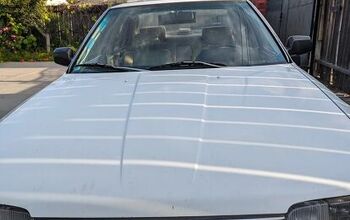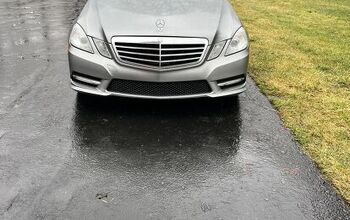Trade War Watch: Were the Auto Tariffs Ever Supposed to Be More Than a Threat?

The U.S. Commerce Department has submitted draft recommendations to the White House on its investigation into whether it’s prudent to impose tariffs of up to 25 percent on imported automobiles and parts, based on the premise that they’re a threat to national security. The possibility has the industry in a tizzy, with both foreign and domestic brands lobbying against it.
Truth be told, we half assumed the entire concept was a ruse to bring other nations to the bargaining table with something to lose — a scenario where the United States could be viewed as a favorable alternative to tariff-crazy China. However, China has begun opening its market to foreign automakers while also placing a massive 40 percent duty on American autos, leaving the U.S. at a disadvantage. Now it looks as if the Trump administration may go through with everything.
According to Reuters, two administration officials claim the Section 232 recommendations on ensuring health within the domestic auto industry are undergoing an interagency review process. They’ll be discussed today during the president’s weekly meeting with top trade officials. Thus far, the White House has promised not to move forward with new tariffs on the European Union or Japan as long as it is making constructive progress in trade negotiations.
The EU’s trade commissioner, Cecilia Malmstrom, is scheduled to convene with U.S. Trade Representative Robert Lighthizer in Washington on Wednesday to discuss the negotiations. However, one of the officials claims the Trump administration wanted to send a message for negotiators to get the lead out and make some real headway.
From Reuters:
But having the Commerce report ready for action would underscore a consistent threat from President Donald Trump – that he would impose tariffs on autos and auto parts unless the EU and Japan make trade concessions including lowering the EU’s 10 percent tariff on imported vehicles and cutting non-tariff barriers.
Trump has repeatedly suggested he would move quickly to impose tariffs, even before the Commerce Department launched its investigation in May into whether imported autos and parts pose a national security risk. The study followed closely on the heels of the imposition of similar national security tariffs on steel and aluminum.
“We said if we don’t negotiate something fair, then we have tremendous retribution, which we don’t want to use, but we have tremendous powers,” Trump said on Wednesday. “We have to – including cars. Cars is the big one. And you know what we’re talking about with respect to cars and tariffs on cars.”
In October, the administration said it had planned to open formal trade talks with the European Union and Japan in early 2019 — once the 90-day required congressional notification period ends. But backlash to the proposal cropped up long before that date.
Automakers, unilaterally opposed to higher tariffs, claim there’s no reason to presume imported vehicles and parts risk national security. Of course, security is unlikely a pressing matter within the industry. Already suffering in China due to its steep tariffs, certain brands don’t want additional import trouble.
A group representing major automakers told the Commerce Department in July that imposing tariffs of 25 percent on imported cars and parts would raise cumulative prices for U.S. vehicles by $83 billion annually and risk hundreds of thousands of jobs. According to the The Alliance of Automobile Manufacturers, consumers would see an alleged premium of $6,000 on imported vehicles and roughly $2,000 on domestically assembled products. Some automakers have threatened to scrap future investment in the U.S. if the administration goes through with the fees.
[Image: Nissan]

A staunch consumer advocate tracking industry trends and regulation. Before joining TTAC, Matt spent a decade working for marketing and research firms based in NYC. Clients included several of the world’s largest automakers, global tire brands, and aftermarket part suppliers. Dissatisfied with the corporate world and resentful of having to wear suits everyday, he pivoted to writing about cars. Since then, that man has become an ardent supporter of the right-to-repair movement, been interviewed on the auto industry by national radio broadcasts, driven more rental cars than anyone ever should, participated in amateur rallying events, and received the requisite minimum training as sanctioned by the SCCA. Handy with a wrench, Matt grew up surrounded by Detroit auto workers and managed to get a pizza delivery job before he was legally eligible. He later found himself driving box trucks through Manhattan, guaranteeing future sympathy for actual truckers. He continues to conduct research pertaining to the automotive sector as an independent contractor and has since moved back to his native Michigan, closer to where the cars are born. A contrarian, Matt claims to prefer understeer — stating that front and all-wheel drive vehicles cater best to his driving style.
More by Matt Posky
Latest Car Reviews
Read moreLatest Product Reviews
Read moreRecent Comments
- Bd2 Dark Brandon is doing a great job for the US. I hope he can run for a third term.
- Dave M. My hipster daughter is greatly into it. We watched the race together this weekend. It was interesting but I'm not devoted to it like she is. She'll be at the Austin race in October.
- Bd2 If I had time to watch other people driving, then I would go for LMP.
- Steve Biro There are 24 races on this year’s F1 schedule. And I guarantee you no more than two will be reasonably exciting, Meanwhile, F1’s reception for Andretti reveals the dark underbelly of the sport. I have followed F1 since the 1960s and, frankly, I am running out of interest. I’ll catch a race if it’s convenient but won’t bother DVRing them.
- YellowDuck Been watching since the 80s, seriously since the 90s once we had reliable TV coverage. I'm in Canada though. Hey, and don't forget that the Interlagos race is also in a convenient time zone, as is Mexico. So that's 5 races in the Americas. Absolutely love it, but it takes a bit more interest in the technical / strategic side of things to really appreciate it. It's not just going fast in circles until someone crashes into someone else, while drunk people watch. The US can be proud of what it has contributed - Austin is one of the best tracks on the calendar, Vegas turned out to be much better than anyone could have hoped, and even Miami - a real Indy car-style track - produced a good race this year.


































Comments
Join the conversation
Chicken tax derp, derp. America sucks and Trump sucks derp, derp. Aussie land lost its auto industry and has a crap GDP. Chicken tax good. Trump good.
it amuses me on this site, how a click bait articles can stir up a frenzy ,all good for the pocketbooks of TTAC but most of us reasonable folks can read between the lines and realize that this is just posturing from Washington.USMCA is a great example. If a couple of USDMs decide to import a few less window switches and light bulbs from China, all the better.